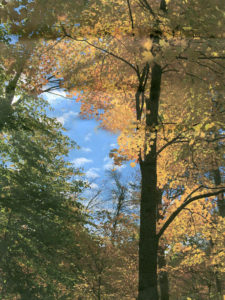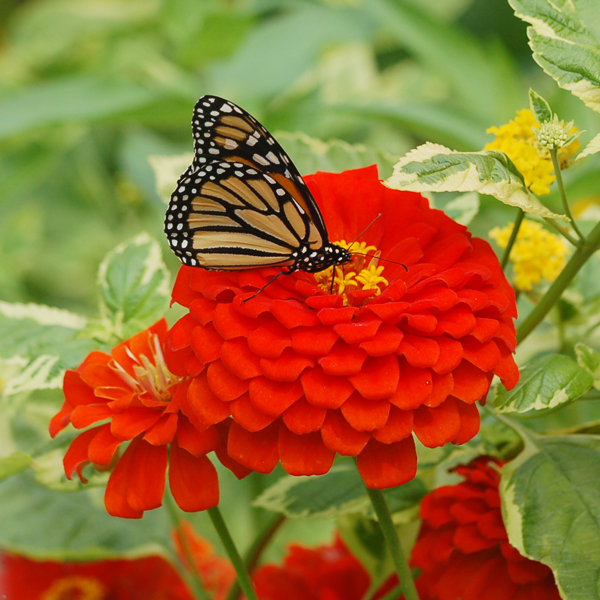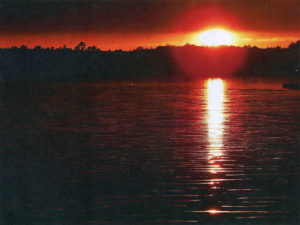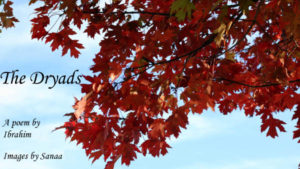Essay Summaries
First Place in the Essay Category
Theme: Sense of Wonder
“The Unnamed Waterfall of Mount Rainier,” by John, age 17, and his Teacher
The author describes a day-long summer hike with his family in Washington State’s Mount Rainier National Park. En route to the mountain top, they learned from a park ranger that the path was iced over, and were redirected to a small glacier-fed lake and a lovely waterfall. There the author had a Zen-like sense-of-wonder experience: “ …My family and I sat next to an unnamed waterfall…I perched there, completely at peace… staring up at the peak of Mount Rainier, listening to the thundering waterfall, entranced by this peaceful state. It was magical….Those simple moments of pure peace are brought to us by nature.”
Theme: Sense of Wonder/Sense of the Wild
“One Species,” by Ashlynn, age 16, and her Mother
“One species can alter an entire ecosystem.” This essay identifies habitat improvements that came about with the introduction of a small number of wolves into Yellowstone National Park in 1995. The wolves helped end the imbalance caused by an overpopulation of deer, thus creating a new and more ecologically sound balance in nature. Though small in number, the wolves helped change the ecosystem and its geography.
First Place in the Mixed Media Category (Essay & Photograph)
Theme: Sense of Wonder
 “The Wind: Nature’s Invisible Hero,” by Alexis, age 9, her sister Madeline, her friend Lauren, and her Mother
“The Wind: Nature’s Invisible Hero,” by Alexis, age 9, her sister Madeline, her friend Lauren, and her Mother
The team members, thinking that their usual impressions of nature are primarily visual, decided to perform an experiment requiring them to, “lie down outside with … eyes closed and experience nature with their other senses” for 10 minutes, and then to describe how nature feels, smells, and sounds. They all noticed that the wind carried most of the non-visual impressions to them, cooled their bodies, and created music in the air. “Before our project,” they concluded, “we had never really thought about the role of wind…now we have a greater appreciation for the role of the wind in nature.” The accompanying photograph of trees in autumn provides a visual record of the day the experiment took place.
Theme: Sense of Wonder/Sense of the Wild
“Marvelous Monarch,” by Mikala, age 12, and her Grandfather
 Mikala is fascinated by Monarch butterflies, an interest shared with and encouraged by her grandfather. Together they visited a pollinator garden during fall where Mikala took a magnificent photo of a migrating Monarch and with her grandfather’s help wrote “Marvelous Monarch.” Mikala’s essay conveys her enthusiasm and concern for Monarchs. She notes that their annual migration can cover up to 3,000 miles and three countries (Mexico, U.S., Canada), and can result in up to four Monarch generations. She worries about their future because “Monarchs are in trouble.” [1] Mikala calls for gardeners to grow plants that can nourish all stages of the Monarch butterfly, including milkweed for the caterpillars and nectar and producing blooms for the adults. She regards as essential the avoidance of chemical pesticides where growing takes place so that the food for Monarchs, bees, and other beneficial pollinators can be wholesome and toxic-free.
Mikala is fascinated by Monarch butterflies, an interest shared with and encouraged by her grandfather. Together they visited a pollinator garden during fall where Mikala took a magnificent photo of a migrating Monarch and with her grandfather’s help wrote “Marvelous Monarch.” Mikala’s essay conveys her enthusiasm and concern for Monarchs. She notes that their annual migration can cover up to 3,000 miles and three countries (Mexico, U.S., Canada), and can result in up to four Monarch generations. She worries about their future because “Monarchs are in trouble.” [1] Mikala calls for gardeners to grow plants that can nourish all stages of the Monarch butterfly, including milkweed for the caterpillars and nectar and producing blooms for the adults. She regards as essential the avoidance of chemical pesticides where growing takes place so that the food for Monarchs, bees, and other beneficial pollinators can be wholesome and toxic-free.
[1] A 90% decline in Monarch numbers has occurred since 2000 in part due to widespread use of pesticides in agriculture and elsewhere, eliminating milkweeds and other wildflowers from roadsides, hedgerows, fields, and gardens along migratory routes through the U.S. taken by these iconic butterflies.
Honorable Mention in the Essay Category
Theme: Sense of Wonder
“Adventures on a Walk” by Michael, age 17, and his Grandfather
A grandfather delights in recounting the highlights of his first shared outdoor walk with his toddler-aged grandson. To the toddler, everything seems adventurous, new, and exciting. A squirrel dashes up a tree, windblown leaves on the sidewalk dance magically, and daffodil blossoms seem to be “little suns.” Rushing home, the child excitedly shares his adventures with his mother, while Grandpa reflects that “something as simple as a walk was so exciting for a child.”
Theme: Sense of Wonder
“The Great Outdoors,” by Nicole, age 18, and her Teacher
The author describes her family’s wonderful adventures camping and hiking in the forests of Michigan’s Upper Peninsula: sharing the use of a pond with a deer, crossing a river on stepping stones, and traveling to the bluffs and the bay with her brother, Dad, and Mom. Back in camp they prepare and eat supper at a campfire, sing campfire songs under a starry sky, and sleep in a tent.
Poem Summaries
First Place in the Poem Category
Theme: Sense of Wonder
“A Day of Wonder,” by Katie, age 17, and her Teacher
In this poetic collaboration, Katie and her teacher take us through the wondrous beautify of a single day—from sunrise to moonlit evening—celebrating each bird, berry, cricket, and cloud. Rich in sensory detail, the poem transports us through its day of wonder, then leads us past a sky of dancing stars toward home.
Theme: Sense of Wonder/Sense of the Wild
“Wandering Wind,” by Connor, age 18; Cassidy, age 17; and their Teacher
This team of three put together an “acrostic” poem that celebrates nature and enacts the interdependence of living things. Within its circular structure, the poem evokes wind, seeks, branches, eggs, birds, and—once again, breeze—each illustrated in service to the others.
First Place in the Mixed Media Category (Poem & Photo)
Theme: Sense of Wonder
 “Light to Dark,” by Haley, age 16, and her Teacher
“Light to Dark,” by Haley, age 16, and her Teacher
In this collaboration, a beautiful sunset inspired Haley to take a photograph that, in turn, inspired an intergenerational poetic response of equal beauty. In evoking the changing light and how it transforms the world around it, we are treated to layer upon layer of “wonder.”
Theme: Sense of Wonder/Sense of the Wild
 “The Dryads,” by Ibrahim, age 12, and his Aunt
“The Dryads,” by Ibrahim, age 12, and his Aunt
Ibrahim and his aunt pair up to present a celebration of tree spirits with lovely photographs of trees. In its formal diction and imagery, the poem is both an appreciation of the natural world and an homage to the rhapsodic odes of the past.
Honorable Mention in the Poem Category
Theme: Sense of Wonder
“The Month’s Seasons,” by Maddie, age 16, and her Teacher
In a lovely evocation of seasonal wonders, this poem takes us month-by-month through an entire year in the life of trees and their leaves, celebrating each season’s animal life along the way: fawns, birds, dogs, fish, bees, cats, owls, turkeys, and a mysterious raccoon.
Honorable Mention in the Mixed Media Category (Poem & Photo)
Theme: Sense of Wonder
“Wisconsin’s Devil’s Lake,” by Abbey, age 16, and her Teacher
A happy evocation of hiking, “all sweat and smiles,” in a landscape of carved cliffs and clear waters. Wonderful sense of place in this poem, as well as the peace and relief nature can bring to us.
Special Mention Desgination: Why Have It For 2016?
The Special Mention designation is included in 2016 to acknowledge two entries, by Damian and Leah (described below), that provide important complimentary advice regarding our interactions with nature.
Damian urges young people spend more time outdoors for the sense of wonder it provides. His recommendation is supported by data showing nature’s beneficial effects on human health. Also, it is one way for individuals to develop a deeper appreciation for the valuable environmental features on which society depends.
Leah cautions that our intrusions into natural areas can have adverse impacts on the animals living there. She advises that we remain mindful of wild animals’ need for their own habitat free of our highways and towns.
Both approaches are important. Celebrating nature’s wonders with glorious adventures in wild areas combined with a sensitivity to the needs of native animals and plants can prevent us from taking actions detrimental to their survival. We need them as a source for wonder, and for their essential ecosystem services that are vital to and enrich all life on our planet.
Further, as naturalist Henry Beston suggested, we may have the “need for another wiser and perhaps more mystical concept of animals…They are not brethren, they are not underlings; they are other nations, caught with ourselves in the net of life and time, fellow prisoners in the splendor and travail of the earth.” (The Outermost House: A Year of Life on the Great Beach of Cape Cod, 1949)
— Diana Post
Special Mention in the Poem Category
Theme: Sense of Wonder
“Sense of Wonder: A Message to Today’s Youth,” by Damian, age 17, and his Teacher
The poetry entry from Damian’s team expresses concern that young people spend too much time indoors away from nature. In verse, Damian encourages them to simply go outside for the sense of wonder rewards that nature offers. His poetic advice includes the following:
“Take a look at a redwood tree.
Take a nature hike, and let it make you carefree
“Take a look at something that’s green.
Realize there’s more to life than your computer screen.”
Special Mention in the Essay Category
Theme: Sense of Wonder/Sense of the Wild
“Spring Woods,” by Leah, age 17, and her Teacher
Leah’s team submitted an essay that describes a walk through the woods in spring from different perspectives: that of humans and of wild animals. Reflecting an uncommon sensitivity, she tries to imagine how the animals could be unfavorably affected by human intrusions into their wild living space. She cautions us, as humans, to “be aware of your surroundings,” noting that a human-directed change such as a road, a town, or another alteration of a natural area can adversely impact “animals yearning for peace and space.”

